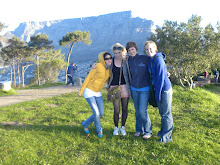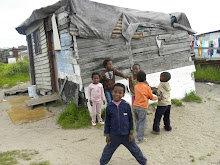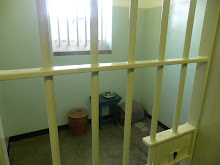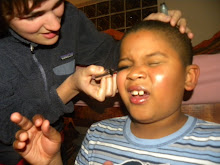So for you man readers out there, I gotta tell you about this meat joint that some interns and I visited 2 Fridays ago. Let's be honest--vegetarians have nightmares about places like this. The place is called Mzolis and it is located in one of the townships (for those of you who don't know, townships were created largely after the apartheid government's Groups Areas Act in the 50s and 60s that evicted the majority of the black and coloured populations from their homes near the city center to a barren land of shantytowns on the fringes of the city) called Gugulethu. The place is BYOD (bring your own drinks) and consists of about 30 round tables under a tent. You go inside the building next door to order in front of a giant counter with pounds and pounds of raw lamb, sausage, pork and chicken behind it. Your order your meat, pay and take it through a dark and sketchy hallway to a grill in the back. 15 minutes later you come back to the sweetest gift of the angels above: a giant bowl of mixed grilled meat in a savory BBQ sauce. You stumble tipsy-like to your table and join your friends animalistically fending off one another as they rip the meat apart in the bowl and stuff it into their mouths with their bare hands. 20 minutes and some major food baby later, you find yourself dancing around the table with your friends and grinning from ear to ear with meat sauce smeared across your cheeks, hands, arms and clothes. YUMMY!
While not spending every free minute packing on the pounds at Mzolis, I've been doing some really interesting work on women's and LGBT rights at the office. While South Africa was the first country to outlaw discrimination on the basis of sexual orientation, homophobia runs rife. Polls estimate that 80% of south africans are homophobic, and news of "corrective" rapes (where a man rapes a lesbian with the intent of "curing" her sexuality or punishing her), tortures and murders of LGBT individuals are all too common. Many social theorists link the violence to stress of unemployment and poverty that the majority of the perpetrators experience in the townships. Of the 36 reported murders of lesbians in south africa in 1998, only 2 cases came to trial, leading to only one conviction. My roommate and I are working with an incredibly committed and organized local NGO called Triangle Project to monitor the murder trial of Zoliswa Nkonyana . She was beaten by youths, aged between 17 and 20, who chased her, pelted her with bricks and finally beat her with a golf club a few metres from her home (http://www.mg.co.za/article/2006-02-26-not-just-another-murder). Unfortunately, events like this are all too common in south africa...and across the world.
I cannot help but feel that while an individual should be entitled to forming his or her own moral suppositions regarding sexuality and sexual identity, it is absolutely unacceptable for any person to express those views through physically, verbally or psychologically violent means. Ideologies and belief systems, similar to culture, are not inherently bad, but become problematic when they harm other human beings and violate certain fundamental human rights. To fight for the protection of another person's human rights is does not mean you must condone his or her lifestyle and behaviors. You simply recognize the other as a human being who, like you, is entitled to human dignity...for reallllzzzzz.
Monday, September 14, 2009
Wednesday, September 2, 2009
Greetings from Cape Town
(please excuse my rambles, incoherence and spelling issues...I don't have a lot of internet time!!)
Many South Africans refer to Cape Town as the mother city, a beautiful haven on the confluence of 2 oceans, and a home to one of the most diverse collections of people anywhere in the world. 3 days here and I am hooked...wonderfully and nervously aware that this place and these people--their stories, their lifestyles, their histories, their suffering, their resilience, will change me forever.
Day 1 at the Projects Abroad Human Rights Office: overwhelmed by an office in transition, with interns leaving for their fall terms at universities all over europe, asia and america, my roommate and I are given our first case. He is refugee from the Democratic Republic of Congo (DRC): 26 years old, arrived in south africa in 2002 fleeing the violent conflict in E. DRC that has claimed 6 million lives including his family with the exception of his brother. He was taken in by a woman who immigrated to Canada, played for a soccer team until they reached a level where only south africans or those foreignors with the necessary documentation (which no one in flight ever imagines themselves being in the situation of needing to bring such papers), and was given work as a security guard for 2 months (the second month of which he was only given half pay). Like so many refugees from other african nations, this man has been a victim of xenophobic threats and attacks, forced to hide in a mosque after vigilantes visited his house and threatened to kill him and his rwandan roommate. He now has nowhere to stay, no job (refugees have a TOUGH time finding work in south africa due to both discrimation and the extremely high level of unemployment). So here is this man, 5 yearse older than myself, sitting across from myself, my roommate and one other intern in a conference room. He has nowhere else to go...sees no future for himself in south africa...and wants to return to E. Congo with the hopes of finding work amongst farmers.
Unknown to him however, war still rages in E. Congo where people are being slaughtered every day. It is not safe there and he cannot go home. The United Nations High Commission for Refugees (UNHCR) won't help him...they won't prevent him from returning but also will not be responsible for such a "liability." Thus, his one shred of hope that he has been clinging to for months, the prospect of going home, is crushed. The UN could assist him in reaching W. DRC, but in a country nearly as large as western europe, he does not want to go there...it is not his home.
I wonder, what is this world doing to its young people, to its future generations? I wonder what his life would look like had he not been forced by a history and continuation of domestic and internaitonal violence, greed and corruption, to leave his home? Can any of us back home in the US even imagine the physical, psychological and emotional trauma he has experienced?
He came in today to meet with us about finding shelter, food and work...I asked him how he was doing and he replied, "I am really suffering, really suffering"...we found him a place to stay in a shelter that offers free food, accomodation, and work for those who have no money to pay their way. A social worker is on staff to help him find work, and my colleague and I are committed to finding him more adequate housing, as well as to get him in touch with some of our office's contacts who are willing to hire refugees.
Imagine what it would mean for one life to be changed forever, to be redirected from returning home to a warzone, and to instead, be allowed to on their own terms, to move forward self-sufficiently with their fundamental human rights of LIFE, dignity, adequate shelter, freedom from violence, food, access to health care, employment, etc...preserved.
sometimes it seems that the world is just fucked and that we just need to learn to tolerate this shithole...I'm still wrestling with all of this, but I do know that lives can be transformed through choices and the creation of opportunities, through the commitment to keep fighting...and while global picture is bleak, we must never forget that every human life matters.
may we not participate with our silence, julia
Many South Africans refer to Cape Town as the mother city, a beautiful haven on the confluence of 2 oceans, and a home to one of the most diverse collections of people anywhere in the world. 3 days here and I am hooked...wonderfully and nervously aware that this place and these people--their stories, their lifestyles, their histories, their suffering, their resilience, will change me forever.
Day 1 at the Projects Abroad Human Rights Office: overwhelmed by an office in transition, with interns leaving for their fall terms at universities all over europe, asia and america, my roommate and I are given our first case. He is refugee from the Democratic Republic of Congo (DRC): 26 years old, arrived in south africa in 2002 fleeing the violent conflict in E. DRC that has claimed 6 million lives including his family with the exception of his brother. He was taken in by a woman who immigrated to Canada, played for a soccer team until they reached a level where only south africans or those foreignors with the necessary documentation (which no one in flight ever imagines themselves being in the situation of needing to bring such papers), and was given work as a security guard for 2 months (the second month of which he was only given half pay). Like so many refugees from other african nations, this man has been a victim of xenophobic threats and attacks, forced to hide in a mosque after vigilantes visited his house and threatened to kill him and his rwandan roommate. He now has nowhere to stay, no job (refugees have a TOUGH time finding work in south africa due to both discrimation and the extremely high level of unemployment). So here is this man, 5 yearse older than myself, sitting across from myself, my roommate and one other intern in a conference room. He has nowhere else to go...sees no future for himself in south africa...and wants to return to E. Congo with the hopes of finding work amongst farmers.
Unknown to him however, war still rages in E. Congo where people are being slaughtered every day. It is not safe there and he cannot go home. The United Nations High Commission for Refugees (UNHCR) won't help him...they won't prevent him from returning but also will not be responsible for such a "liability." Thus, his one shred of hope that he has been clinging to for months, the prospect of going home, is crushed. The UN could assist him in reaching W. DRC, but in a country nearly as large as western europe, he does not want to go there...it is not his home.
I wonder, what is this world doing to its young people, to its future generations? I wonder what his life would look like had he not been forced by a history and continuation of domestic and internaitonal violence, greed and corruption, to leave his home? Can any of us back home in the US even imagine the physical, psychological and emotional trauma he has experienced?
He came in today to meet with us about finding shelter, food and work...I asked him how he was doing and he replied, "I am really suffering, really suffering"...we found him a place to stay in a shelter that offers free food, accomodation, and work for those who have no money to pay their way. A social worker is on staff to help him find work, and my colleague and I are committed to finding him more adequate housing, as well as to get him in touch with some of our office's contacts who are willing to hire refugees.
Imagine what it would mean for one life to be changed forever, to be redirected from returning home to a warzone, and to instead, be allowed to on their own terms, to move forward self-sufficiently with their fundamental human rights of LIFE, dignity, adequate shelter, freedom from violence, food, access to health care, employment, etc...preserved.
sometimes it seems that the world is just fucked and that we just need to learn to tolerate this shithole...I'm still wrestling with all of this, but I do know that lives can be transformed through choices and the creation of opportunities, through the commitment to keep fighting...and while global picture is bleak, we must never forget that every human life matters.
may we not participate with our silence, julia
Subscribe to:
Posts (Atom)






